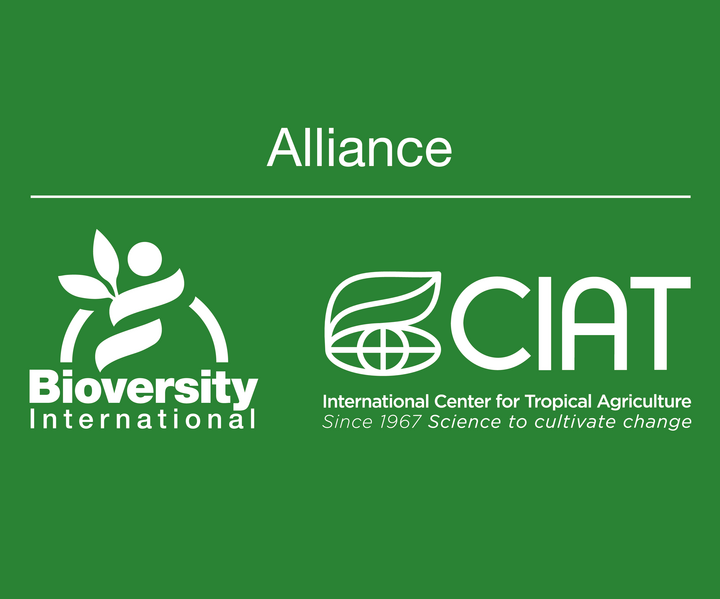Press and News Bioversity International and CIAT continue to make exciting progress in establishing an Alliance

Communiqué n.4 – Bioversity International and the International Center for Tropical Agriculture (CIAT) advance in defining the vision, mission and strategic objectives of the Alliance, and in selecting the new Director General of Bioversity/CEO-Designate of the Alliance.
Bioversity International and the International Center for Tropical Agriculture (CIAT) continue to make exciting progress in establishing an Alliance that promises to consolidate their role as global influencers in agriculture, nutrition, environment, biodiversity and technology. The Alliance will develop and deploy innovative, demand-driven, evidence-based and scalable solutions that contribute toward achieving sustainable food systems, improve land management, harness agrobiodiversity and leverage the power of the digital and genomic revolutions. Through the Alliance, both Centres will ramp up their focused contributions to the Sustainable Development Goals, Paris Agreement, Aichi Biodiversity Targets and Bonn Challenge, among other critically important global objectives.
The Alliance’s strategic presence in Rome will facilitate strengthening of supportive partnerships with the Rome-based United Nations organizations, namely the Food and Agriculture Organization, the International Fund for Agricultural Development and the World Food Programme. Above all, both Centres will continue to push beyond traditional research and deepen engagement in regional and national-level research-for-development agendas in focus countries across Africa, Asia, Latin America and the Caribbean. Working with government agencies, the private sector, multilateral institutions, development banks, non-governmental organizations and civil society, the Alliance will deliver greater impact.
Recently (17–18 October), the Centres held a 2-day retreat in Amsterdam, hosted by the Ministry of Foreign Affairs of the Netherlands at the KIT Royal Tropical Institute, to begin to define the Alliance’s vision, mission, strategic objectives and unique value proposition. Thirty leaders from the two Centres took part in the retreat and produced initial drafts of the statements, which have been circulated to all staff for feedback. Senior leadership from both Centres will consider this input as they prepare final versions and present these to their Boards of Trustees for review in the coming weeks.
The strategic development of the Alliance is being informed by an internal analysis and external consultation with key stakeholders and partners. From those analyses, five areas of focus emerge to further guide efforts toward building the Alliance.
- Demonstrate alignment and contribution to the global agenda, and thus the priorities of international agencies, governments and funders
- Focus on delivering impact at scale, taking research to application through effective partnerships with the private sector and development partners
- Position research activities in national agricultural agendas, align with national research centres and use this to forge partnerships with the multilateral development banks and other funders
- Capitalize on the role of technology in the fourth industrial revolution towards sustainable agricultural systems and agrobiodiversity for improved nutrition
- Use this Alliance to capitalize on respective strengths of the two Centres, while leveraging opportunities for greater efficiencies.
The retreat took place five weeks after the scientific leadership of both Centres met in Bonn hosted by BMZ and GIZ Germany (September 4–7) to begin to develop an advanced and synergistic research-for-development agenda that capitalizes on their collective expertise (see Communiqué n.3), including the conservation and use of plant genetic resources; food systems for healthy and safe diets; integrated seed systems; crop genetic improvement; landscape restoration; sustainable intensification and diversification of farming systems; pest and disease management; agricultural risk management; and digital agriculture. A rapid-response policy advisory services mechanism was also put forward as a clear opportunity for both Centres to expand the reach and impact of their research efforts. Both Centres are well-positioned to contribute to transformative change towards greater gender equality, social inclusion and women’s and men’s empowerment.
In parallel to these meetings, a committee constituted of four members from each Centre’s Board of Trustees, along with one senior staff member from each Centre, has been leading the selection process of the new Director General (DG) of Bioversity International, who will assume this role in March 2019, and then be appointed the CEO of the Alliance at the beginning of 2020. The current DG of CIAT will remain in his position until December 2019. It is intended that the appointment of the new DG of Bioversity/CEO-Designate of the Alliance will be announced during the joint meeting of the Bioversity and CIAT Boards on November 27, hosted by the World Bank in Washington DC.
In the meantime, harmonization of Bioversity and CIAT’s business models is proceeding apace. The leadership of our Science, Human Resources, Finance and Administration, and Partnerships and Communications teams is already working together. Joint proposals to funders have been prepared and submitted, an Alliance communications plan is under development, collaborative selection processes for new hires are taking place, and teams are being collocated in some countries, thus facilitating greater collaboration between the Centers.
Bioversity International and CIAT wish to thank the following agencies who have provided valuable insights through a stakeholder consultation for the establishment of the Alliance thus far: Bill & Melinda Gates Foundation, CGIAR Systems Organization, Chinese Academy of Agricultural Sciences, Clarmondial AG, Crop Trust, EuropeAid of the European Commission, GIZ Germany, Global Environment Facility, Ingredion, Inter-American Development Bank, International Fund for Agricultural Development, Italian Development Cooperation, Netherlands Ministry of Foreign Affairs, Syngenta, The Nature Conservancy, The World Bank, UK Department for International Development, UK Biotechnology and Biological Sciences Research Council, United States Agency for International Development and Vietnam Academy of Agricultural Sciences.
For further information about the Alliance process, please contact Ann Tutwiler (Bioversity International) or Ruben Echeverría (CIAT).
Julia Marton-Lefèvre, Chair, Bioversity International Board of Trustees
Geoffrey Hawtin, Chair, CIAT Board of Trustees
